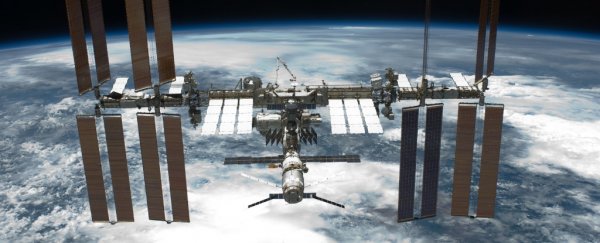The head of NASA, Jim Bridenstine, is not happy with how other world leaders are treating space.
Speaking at a recent Town Hall, the space agency's highest ranking official admonished the Indian government for shooting down a satellite in low orbit, calling the test "unacceptable".
"That is a terrible, terrible thing to create an event that sends debris in an apogee that goes above the International Space Station," Bridenstine said at the town hall.
"And that kind of activity is not compatible with the future of human spaceflight that we need to see happen."
Anyone who's seen the film Gravity knows that debris is especially dangerous for the International Space Station. Orbiting around Earth at incredible speeds, even the smallest piece of junk can cause serious damage.
On March 27, India became the fourth nation in the world to shoot down a satellite in space, sending hundreds, if not thousands of pieces of debris flying.
In the past, China, Russia, and the US have all done the same, and each time, there were serious conversations about the dangers of debris and what some consider unnecessary displays of military might.
"The test was done in the lower atmosphere to ensure that there is no space debris," India's Ministry of External Affairs stated in a press release.
"Whatever debris that is generated will decay and fall back onto the earth within weeks."
#MissionShakti : Congratulations to the scientists of @isro & @DRDO_India on successful testing of Anti-Satellite Missile technology.
— Indian Air Force (@IAF_MCC) March 28, 2019
India destroyed a live Low Earth Orbit satellite 300km away through #ASAT .
IAF wishes greater success & glories in future. Jai Hind!!! pic.twitter.com/f53YHNrewH
But even though the mission was carried out in low orbit, according to NASA it still jeopardises the safety of the ISS and those on board. Of all the debris created, the agency says it is currently tracking 60 pieces, some of which will even swing into orbit above the ISS, causing further alarm.
"Some 60 pieces of orbital debris have been tracked so far, 24 out of which poses risk to the International Space Station," said Bridenstine.
"The risk to the International Space Station was increased by 44 percent," he added.
Luckily, all six astronauts on the ISS are safe for now, but that doesn't mean NASA is overreacting to the news. While it's entirely legal for a nation to shoot down one of its own satellites, the display does raise questions about the purpose of such risky endeavours.
Alice Gorman, an Australian space archaeologist and debris expert, told CNET that any fragmentation event is dangerous and not for scientific purposes, describing these missions as "purely and simply a visible demonstration of power."

Of course, NASA does have emergency procedures in case a piece of debris does approach the ISS. If that happens, and the station cannot be steered away, the astronauts on board are supposed to take shelter in "lifeboats" that will take them safely back to Earth.
This is obviously a last ditch scenario and not something that anyone wants to deal with. Nevertheless, the more debris orbiting around our planet, the higher the chances of something like this happening.
As more countries develop anti-satellite machinery, the question about who has the right to litter space will only become more controversial.
"At the end of the day we have to be clear also that these activities are not sustainable or compatible with human spaceflight," said Bridenstine.
